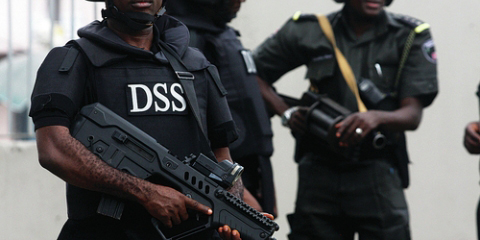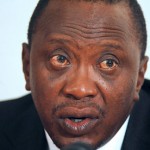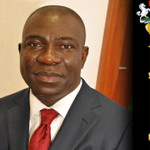OPINION: Preserving the Majesty of the DSS
Articles/Opinion, Featured Contributors/Columnists, Latest Headlines Monday, April 17th, 2017
By Sufuyan Ojeifo
(AFRICAN EXAMINER) – I have, over the years, held the State Security Service (SSS) otherwise known as the Department of State Services (DSS) in reverential awe for its yeoman job, which has the citizenry as the focus of its security architecture. Talking about the security of a nation means investing concerns in the safety of the people as a first step towards attaining peace and stability in which context citizens’ welfare is better pursued and guaranteed.
Over time, I have read some novels and watched some films in which the investigative and security wizardry of the America’s Federal Bureau of Investigation (FBI) and the British MI5, was celebrated in fictive narratives and cinematic storylines that have been characteristically packaged to compellingly dramatise the near invincibility of these agencies in unraveling security jigsaw puzzles.
These agencies are typically presented as omnipresent and, sometimes, omniscient even when it is clear that these are divine attributes. They depend on citizens’ cooperation to garner and harness information on which they build their investigations. The frequency, at which they proactively and reactively burst crimes as well as effectively coordinate what have turned out to be their investigative breakthroughs, has created a positive international perception that reinforces their majesty.
Promoting a greater sense of patriotism and confidence in the ability of the state to protect the citizenry is the essence of government and governance. And, to that extent, the citizens’ sense of longing and belonging to the security architecture is stimulated and increased towards acts like whistle-blowing and provision of information pro-bono that will conduce to strengthening national security. This is the driving force that underpins the near enigmatic success stories of some intelligence agencies in the West.
Growing up as a student and in the early part of my more than two decades in journalism practice, I had looked at the SSS (that was the common description after the scrapping of the National Security Organisation-NSO- which Abdullahi Mohammed, Umaru Shinkafi and Mohammed Lawal Rafindadi- were privileged to preside over as Directors General from 1976 to 1985) from the prism of foreign security agencies.
I have never doubted the integrity, capacity and competence of the DSS right from the leadership of Ismaila Gwarzo (1986-90), Albert Horsfall (1990-92), Peter Nwaoduah (1992-98), Kayode Are (1999-2007), Afakriya Gadzama (2007-2010), Ita Ekpeyong (2010-2015) to the incumbent, Lawal Daura; and I just hope the Buhari presidency will not imprudently destroy the basis of my confidence in the DSS.
Rather, what have distinguished these leaderships are their operational styles. Dispensations differ temperamentally; they act peculiarly to the tension of goals and objectives that define their overall focus; but the nexus between and among them remains the achievement of national security, which is the obligatory bigger picture.
The modus operandi of the DSS under different administrations has been largely shaped by the characters of the successive incumbent executive heads and the socio-political conditions in which they operate. Whereas the DSS had, since inception, operated quietly in discharging its security surveillance task, including profiling Nigerians and persons of interest, it became understandably rambunctious under the Goodluck Jonathan administration due to the war declared on the Nigerian state by the Boko Haram insurgents.
The agency, which should have operated incognito, had to activate its public communication apparatus in order to engage more with the Nigerian people on what was being done, at every intersection, to preserve national security.
With Buhari in the saddle as president and Daura as Director General of the SSS or DSS, the focus is fast changing even if the strategy is not too dissimilar. The agency still engages with Nigerians through its public communication machinery. Boko Haram threats and attacks no longer, frequently, assail our sensibilities as the administration has substantially won the war.
However, a series of arrests of Boko Haram suspects, who now go for soft targets, have been announced since Daura came on board. The recent most significant success was the foiling of the planned terrorists’ attacks on some embassies in the country.
The DSS offensives, presently, have been focused on recovery of arms and ammunitions from individuals and groups so as to contain the proliferation of small arms, which portends serious danger to the security, peace and stability of the nation. Ending herdsmen’s fatal offensives on their host communities nationwide is a priority of the agency.
A number of prominent persons have been arrested for being in possession of either some arms or caches of arms and ammunition plus huge sums of money. The fear of ethnic retaliations, sponsored by some rich bigots, is a plausible theory and basis of security suspicion and actions.
Indeed, the agency has remarkably expanded the frontiers of its security task beyond the traditional profiling of persons of interest, and protecting government officials, to actually going in situ to burst syndicates and effect seizure of arms and ammunition as well as arrest complicit individuals.
The Buhari administration is under pressure to combat crimes and criminalities including corruption, which it has promised to fight to the finish. The DSS has reinforced the battle. The agency’s fidelity to the battle manifested in the profiling of the chair of the Economic and Financial Crimes Commission (EFCC), Mr Ibrahim Magu, in a requisite security report to the senate for the screening and confirmation hearing of his nomination.
The agency’s report said that Magu failed the integrity test and could not be trusted to occupy the office of EFCC chair in a substantive capacity. It has become the case of a hunter becoming the hunted. This helps to purify the process of endorsing the anti-corruption Czar. Whoever wants to come to equity must do so with clean hands. Public credibility and confidence in the anti-graft war are, thus, enhanced.
The DSS has not acted unusually. Interestingly, critics of the agency’s report on Magu did not disagree with its report on some judges accused of corruption; they had defended the invasion of the judges’ residences by the agency and its report that indicted them as consistent with the workings of the service. So what has changed in the case of Magu?
All public officials, and even private individuals, are subjects of such security profiling by the DSS. Whenever anyone is to be appointed into public office, his or her name is sent to the DSS for profiling. Whoever fails the security checks becomes encumbered. This is the beauty of security profiling, the majesty of the DSS that places it over other security agencies.
This is the majesty that the Buhari administration must preserve. The DSS job should be shielded from politics. The president or presidency should not, advisedly, make the mistake of rubbishing the report of the DSS, which is one of the critical faces of the nation’s security intelligence community, to “justify” an individual. That will be unfortunate; indeed, depressing for Nigeria and her security architecture.
The senate has done its bit by acting on the DSS report on Magu, refusing to confirm him as substantive chair of the EFCC, thus preserving the majesty of the DSS and its report. To be sure, the DSS report has indicted an individual and not the institution of the EFCC, thereby insulating the commission from collateral damage.
Mr Ojeifo contributed this piece from Abuja via ojwonderngr@yahoo.com
Related Posts
Short URL: https://www.africanexaminer.com/?p=38897






















